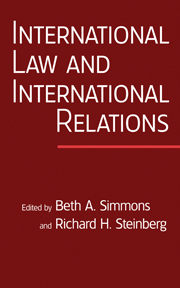Book contents
- Frontmatter
- Contents
- Contributors
- Abstracts
- Preface
- Editors' Note
- PART I INTERNATIONAL REGIMES THEORY: DOES LAW MATTER?
- 1 Structural Causes and Regime Consequences: Regimes as Intervening Variables (1982)
- 2 The Demand for International Regimes (1982)
- PART II COMMITMENT AND COMPLIANCE
- PART III LEGALIZATION AND ITS LIMITS
- PART IV INTERNATIONAL LAW AND INTERNATIONAL NORMS
- PART V TREATY DESIGN AND DYNAMICS
- PART VI LAW AND LEGAL INSTITUTIONS
- PART VII OTHER SUBSTANTIVE AREAS OF INTERNATIONAL LAW
- References
- Index
2 - The Demand for International Regimes (1982)
Published online by Cambridge University Press: 05 June 2012
- Frontmatter
- Contents
- Contributors
- Abstracts
- Preface
- Editors' Note
- PART I INTERNATIONAL REGIMES THEORY: DOES LAW MATTER?
- 1 Structural Causes and Regime Consequences: Regimes as Intervening Variables (1982)
- 2 The Demand for International Regimes (1982)
- PART II COMMITMENT AND COMPLIANCE
- PART III LEGALIZATION AND ITS LIMITS
- PART IV INTERNATIONAL LAW AND INTERNATIONAL NORMS
- PART V TREATY DESIGN AND DYNAMICS
- PART VI LAW AND LEGAL INSTITUTIONS
- PART VII OTHER SUBSTANTIVE AREAS OF INTERNATIONAL LAW
- References
- Index
Summary
We study international regimes because we are interested in understanding order in world politics. Conflict may be the rule; if so, institutionalized patterns of cooperation are particularly in need of explanation. The theoretical analysis of international regimes begins with what is at least an apparent anomaly from the standpoint of Realist theory: the existence of many “sets of implicit or explicit principles, norms, rules, and decision-making procedures around which actor expectations converge,” in a variety of areas of international relations.
This article constitutes an attempt to improve our understanding of international order, and international cooperation, through an interpretation of international regime formation that relies heavily on rational-choice analysis in the utilitarian social contract tradition. I explore why self-interested actors in world politics should seek, under certain circumstances, to establish international regimes through mutual agreement; and how we can account for fluctuations over time in the number, extent, and strength of international regimes, on the basis of rational calculation under varying circumstances.
Previous work on this subject in the rational-choice tradition has emphasized the “theory of hegemonic stability”: that is, the view that concentration of power in one dominant state facilitates the development of strong regimes, and that fragmentation of power is associated with regime collapse.
- Type
- Chapter
- Information
- International Law and International RelationsAn International Organization Reader, pp. 18 - 40Publisher: Cambridge University PressPrint publication year: 2007
- 2
- Cited by



